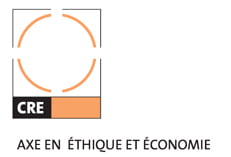-

Jennifer Morton (Université de Pennsylvanie)
Quand : 25 septembre 2025 @ 12:00 – 13:30Où : En ligne.Présentation offerte dans le cadre des activités du Réseau de philosophie du travail.
-

Ben Laurence (Université de Chicago)
Quand : 20 novembre 2025 @ 12:00 – 13:30Où : En ligne.Présentation offerte dans le cadre des activités du Réseau de philosophie du travail.
-

Elvira Basevich (Université de Californie, Davis)
Quand : 22 janvier 2026 @ 12:00 – 13:30Où : En ligne.Présentation offerte dans le cadre des activités du Réseau de philosophie du travail.
-

Tatiana Llaguno (Université Pompeu Fabra, Barcelone)
Quand : 20 mars 2026 @ 12:00 – 13:30Où : En ligne.Présentation offerte dans le cadre des activités du Réseau de philosophie du travail.
Événements passés
 5 Juin 2025 - Groupe de lecture en philosophie et éthique de l’économie
5 Juin 2025 - Groupe de lecture en philosophie et éthique de l’économie 15 Mai 2025 - Julie Rose (Université Dartmouth)
15 Mai 2025 - Julie Rose (Université Dartmouth) 9 Mai 2025 - Groupe de lecture en philosophie et éthique de l’économie
9 Mai 2025 - Groupe de lecture en philosophie et éthique de l’économie 17 Avr 2025 - Groupe de lecture en philosophie et éthique de l’économie
17 Avr 2025 - Groupe de lecture en philosophie et éthique de l’économie 3 Avr 2025 - Groupe de lecture en philosophie et éthique de l’économie
3 Avr 2025 - Groupe de lecture en philosophie et éthique de l’économie 20 Mar 2025 - Groupe de lecture en philosophie et éthique de l’économie
20 Mar 2025 - Groupe de lecture en philosophie et éthique de l’économie 3 Avr 2025 - Theron Pummer (University of St. Andrews) et Ben Sachs-Cobbe (University of St. Andrews)
3 Avr 2025 - Theron Pummer (University of St. Andrews) et Ben Sachs-Cobbe (University of St. Andrews) 30 Jan 2025 - Groupe de lecture en philosophie et éthique de l’économie
30 Jan 2025 - Groupe de lecture en philosophie et éthique de l’économie 13 Fév 2025 - Groupe de lecture en philosophie et éthique de l’économie
13 Fév 2025 - Groupe de lecture en philosophie et éthique de l’économie 13 Jan 2025 - « The Moral and Political Importance of Good Jobs », Joshua Preiss (University of North Carolina, Chapel Hill)
13 Jan 2025 - « The Moral and Political Importance of Good Jobs », Joshua Preiss (University of North Carolina, Chapel Hill) 29 Nov 2024 - Jan Kandiyali (Durham University) et Barry Maguire (University of Edinburgh)
29 Nov 2024 - Jan Kandiyali (Durham University) et Barry Maguire (University of Edinburgh) 5 Juin 2024 - Colloque en philosophie de l’économie (4ème édition)
5 Juin 2024 - Colloque en philosophie de l’économie (4ème édition) 21 Mai 2024 - Groupe de lecture en philosophie de l’économie
21 Mai 2024 - Groupe de lecture en philosophie de l’économie 11 Juin 2024 - Denise Celentano (UdeM)
11 Juin 2024 - Denise Celentano (UdeM) 30 Avr 2024 - Groupe de lecture en philosophie de l’économie
30 Avr 2024 - Groupe de lecture en philosophie de l’économie 17 Mai 2024 - W. Jared Parmer (RWTH Aachen University)
17 Mai 2024 - W. Jared Parmer (RWTH Aachen University) 13 Sep 2024 - Lisa Herzog (UGroeningen)
13 Sep 2024 - Lisa Herzog (UGroeningen) 14 Mai 2024 - Julia D. Hur (New York University)
14 Mai 2024 - Julia D. Hur (New York University) 12 Avr 2024 - Groupe de lecture en philosophie de l’économie
12 Avr 2024 - Groupe de lecture en philosophie de l’économie 26 Mar 2024 - Groupe de lecture en philosophie de l’économie
26 Mar 2024 - Groupe de lecture en philosophie de l’économie 19 Avr 2024 - Anca Gheaus (Central European University)
19 Avr 2024 - Anca Gheaus (Central European University) 15 Mar 2024 - Michael Cholbi (University of Edinburgh)
15 Mar 2024 - Michael Cholbi (University of Edinburgh) 29 Fév 2024 - Groupe de lecture en philosophie de l’économie
29 Fév 2024 - Groupe de lecture en philosophie de l’économie 15 Fév 2024 - Groupe de lecture en philosophie de l’économie
15 Fév 2024 - Groupe de lecture en philosophie de l’économie 25 Jan 2024 - Groupe de lecture en philosophie de l’économie
25 Jan 2024 - Groupe de lecture en philosophie de l’économie 26 Jan 2024 - Atelier innovation démocratique et gouvernance démocratique
26 Jan 2024 - Atelier innovation démocratique et gouvernance démocratique 4 Jan 2024 - Groupe de lecture en philosophie de l’économie
4 Jan 2024 - Groupe de lecture en philosophie de l’économie 28 Fév 2024 - « Ethics by (Organizational) Design: The Structure of Ownership and Governance »
28 Fév 2024 - « Ethics by (Organizational) Design: The Structure of Ownership and Governance » 8 Fév 2024 - Basak Kus (Wesleyan University)
8 Fév 2024 - Basak Kus (Wesleyan University) 4 Déc 2023 - Groupe de lecture en philosophie de l’économie
4 Déc 2023 - Groupe de lecture en philosophie de l’économie 17 Avr 2023 - Lukas Fuchs (TU Eindhoven)
17 Avr 2023 - Lukas Fuchs (TU Eindhoven) 13 Avr 2023 - Critiquing the Direction for Innovation – The Role of Justice and Exnovation
13 Avr 2023 - Critiquing the Direction for Innovation – The Role of Justice and Exnovation 14 Juil 2022 - 6th Social Justice Theory Workshop, 2022
14 Juil 2022 - 6th Social Justice Theory Workshop, 2022 13 Jan 2022 - « The Province of Efficiency Redefined »
13 Jan 2022 - « The Province of Efficiency Redefined » 16 Avr 2021 - Quentin Bruneau (New School for Social Research )
16 Avr 2021 - Quentin Bruneau (New School for Social Research ) 28 Mai 2021 - Money from Nothing by Robert Hockett and Aaron James
28 Mai 2021 - Money from Nothing by Robert Hockett and Aaron James 1 Déc 2020 - Les conséquences économiques et environnementales de la Covid-19: la démondialisation est-elle bonne pour l’environnement?
1 Déc 2020 - Les conséquences économiques et environnementales de la Covid-19: la démondialisation est-elle bonne pour l’environnement? 26 Mai 2020 - Nicolas Treich (Reseach Faculty, INRA)
26 Mai 2020 - Nicolas Treich (Reseach Faculty, INRA) 21 Nov 2019 - Marc Fleurbaey (University Center for Human Values, Princeton University)
21 Nov 2019 - Marc Fleurbaey (University Center for Human Values, Princeton University) 31 Oct 2019 - « If You’re a Classical Liberal, How Come You’re Also an Egalitarian?: A Theory of Rule Egalitarianism »
31 Oct 2019 - « If You’re a Classical Liberal, How Come You’re Also an Egalitarian?: A Theory of Rule Egalitarianism » 30 Avr 2019 - Toward a Political Theory of Inter-Indigenous Recognition
30 Avr 2019 - Toward a Political Theory of Inter-Indigenous Recognition 22 Mai 2018 - « Le concept de santé s’applique-t-il aux écosystèmes? »
22 Mai 2018 - « Le concept de santé s’applique-t-il aux écosystèmes? » 21 Mai 2018 - Sommet Idées7
21 Mai 2018 - Sommet Idées7 24 Avr 2018 - “Exit versus voice – options for socially responsible investment in a liberal state”
24 Avr 2018 - “Exit versus voice – options for socially responsible investment in a liberal state” 10 Avr 2018 - « Is the market a morality-free zone? »
10 Avr 2018 - « Is the market a morality-free zone? » 16 Mar 2018 - Generic Generalizations: Meaning and Social Practices
16 Mar 2018 - Generic Generalizations: Meaning and Social Practices 25 Avr 2018 - Valère Moutarlier (Commission européenne)
25 Avr 2018 - Valère Moutarlier (Commission européenne) 9 Fév 2018 - Matt Adler (Law, Duke University)
9 Fév 2018 - Matt Adler (Law, Duke University) 22 Jan 2018 - Qu’est ce qui rend une chose politique? Le débat au sein de l’Union européenne.
22 Jan 2018 - Qu’est ce qui rend une chose politique? Le débat au sein de l’Union européenne. 28 Mar 2018 - Mark Reiff (University of California at Davis)
28 Mar 2018 - Mark Reiff (University of California at Davis) 22 Fév 2018 - La pensée critique au collégial
22 Fév 2018 - La pensée critique au collégial 29 Jan 2018 - Le magazine Les Débrouillards rencontre la philosophie: récit d’une collaboration
29 Jan 2018 - Le magazine Les Débrouillards rencontre la philosophie: récit d’une collaboration 16 Nov 2017 - L’écosystème des think tanks : quelles demandes pour la pensée critique?
16 Nov 2017 - L’écosystème des think tanks : quelles demandes pour la pensée critique? 10 Nov 2017 - Peter Dietsch (Université de Montréal)
10 Nov 2017 - Peter Dietsch (Université de Montréal) 7 Juin 2018 - « From each according to their abilities, to each according to their needs »
7 Juin 2018 - « From each according to their abilities, to each according to their needs » 12 Déc 2017 - “Ethics and economic space for social innovation – a capabilities perspective”
12 Déc 2017 - “Ethics and economic space for social innovation – a capabilities perspective” 5 Fév 2018 - « Sur l’exploitation »
5 Fév 2018 - « Sur l’exploitation » 9 Nov 2017 - « Impôt et liberté. Quel compromis? »
9 Nov 2017 - « Impôt et liberté. Quel compromis? » 6 Juin 2017 - Éthique et coopératives financières
6 Juin 2017 - Éthique et coopératives financières 16 Mai 2017 - ‘Research jam’ de l’axe éthique et économie du CRE
16 Mai 2017 - ‘Research jam’ de l’axe éthique et économie du CRE 23 Mar 2017 - Dominic Martin (Organisation et ressources humaines, UQAM)
23 Mar 2017 - Dominic Martin (Organisation et ressources humaines, UQAM) 21 Fév 2017 - Thomas Ferretti (University of Toronto)
21 Fév 2017 - Thomas Ferretti (University of Toronto) 7 Fév 2017 - Dominique Bourg (Université de Lausanne)
7 Fév 2017 - Dominique Bourg (Université de Lausanne) 27 Oct 2016 - La rémunération des dirigeants d’entreprise
27 Oct 2016 - La rémunération des dirigeants d’entreprise 21 Sep 2016 - Jürgen De Wispelaere (Université de Tampere)
21 Sep 2016 - Jürgen De Wispelaere (Université de Tampere) 11 Août 2016 - Pour un partage équitable des richesses
11 Août 2016 - Pour un partage équitable des richesses 10 Août 2016 - How can we bring about social justice globally?
10 Août 2016 - How can we bring about social justice globally? 7 Avr 2016 - Les enjeux éthiques de l’austérité
7 Avr 2016 - Les enjeux éthiques de l’austérité 3 Mar 2016 - Les enjeux éthiques de l’austérité
3 Mar 2016 - Les enjeux éthiques de l’austérité 12 Mai 2016 - Les enjeux éthiques de l’austérité
12 Mai 2016 - Les enjeux éthiques de l’austérité 2 Juin 2016 - Les enjeux éthiques de l’austérité
2 Juin 2016 - Les enjeux éthiques de l’austérité 11 Déc 2015 - Martin O’Neill (Department of Politics, University of York)
11 Déc 2015 - Martin O’Neill (Department of Politics, University of York) 1 Déc 2015 - Justice intergénérationnelle, éducation et options ouvertes” / “Intergenerational justice, education and open options
1 Déc 2015 - Justice intergénérationnelle, éducation et options ouvertes” / “Intergenerational justice, education and open options 8 Avr 2015 - Quo vadis, Revenu Québec? Débat sur le rapport Godbout
8 Avr 2015 - Quo vadis, Revenu Québec? Débat sur le rapport Godbout 15 Avr 2015 - Nic Southwood (Australian National University) et Pablo Gilabert (Concordia)
15 Avr 2015 - Nic Southwood (Australian National University) et Pablo Gilabert (Concordia) 18 Sep 2015 - Workshop on the Ethics of Social Risk
18 Sep 2015 - Workshop on the Ethics of Social Risk 1 Juin 2015 - CRÉ Summer School on Global Economic Justice
1 Juin 2015 - CRÉ Summer School on Global Economic Justice 9 Avr 2015 - Workshop on Capitalism & Sustainability
9 Avr 2015 - Workshop on Capitalism & Sustainability 18 Déc 2014 - Subjectivism, Instrumentalism, and Prudence in Hobbes
18 Déc 2014 - Subjectivism, Instrumentalism, and Prudence in Hobbes 13 Nov 2014 - Food Deserts, Justice, and the Distributive Paradigm
13 Nov 2014 - Food Deserts, Justice, and the Distributive Paradigm 3 Fév 2015 - Sur les rôles illégitimes des valeurs dans les interventions d’experts
3 Fév 2015 - Sur les rôles illégitimes des valeurs dans les interventions d’experts 20 Jan 2015 - La Banque Centrale Européenne : un problème démocratique pour l’Europe
20 Jan 2015 - La Banque Centrale Européenne : un problème démocratique pour l’Europe 16 Déc 2014 - International taxation and justice
16 Déc 2014 - International taxation and justice 5 Sep 2014 - Réaliser une société juste: Organisations égalitaires ou État-providence capitaliste?
5 Sep 2014 - Réaliser une société juste: Organisations égalitaires ou État-providence capitaliste? 24 Avr 2014 - Ethical dimensions of monetary policy
24 Avr 2014 - Ethical dimensions of monetary policy 28 Jan 2014 - William Clare Roberts (Université McGill)
28 Jan 2014 - William Clare Roberts (Université McGill)- 11 Déc 2013 - Peter Dietsch (Université de Montréal)
 22 Oct 2013 - Ernest-Marie Mbonda (Université catholique d’Afrique centrale à Yaoundé, Cameroun)
22 Oct 2013 - Ernest-Marie Mbonda (Université catholique d’Afrique centrale à Yaoundé, Cameroun) 17 Oct 2013 - Pierre-Yves Néron (Université Catholique de Lille)
17 Oct 2013 - Pierre-Yves Néron (Université Catholique de Lille) 11 Avr 2013 - Atelier conjoint Toronto/Montréal
11 Avr 2013 - Atelier conjoint Toronto/Montréal 6 Fév 2013 - Penser l’éthique en Afrique. Perspectives camerounaises
6 Fév 2013 - Penser l’éthique en Afrique. Perspectives camerounaises 14 Déc 2012 - Autour de La juste Part
14 Déc 2012 - Autour de La juste Part 9 Déc 2012 - Symposium sur la justice globale autour de deux ouvrages
9 Déc 2012 - Symposium sur la justice globale autour de deux ouvrages



